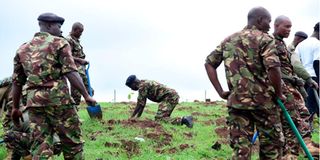8,000 trees planted in Ngong Forest drive

Kenya Defence Forces soldiers plant trees at Ngong Hills Forest Recreational Park in Kajiado county on May 4, 2022.
What you need to know:
- The forest has for years been subjected to degradation through overgrazing and deforestation.
- Tree planting efforts and the ‘adopt-a-site’ programme have improved forest cover, KFS official says.
Efforts to rehabilitate parts of Ngong forest have received a boost with the planting of more than 8,000 seedlings in a project supported by Green Blue Foundation Africa.
The 3077.6-hectare forest has for years been subjected to degradation through overgrazing and deforestation.
The foundation, chaired by Nation Media Group chairman Wilfred Kiboro, has in partnership with Family Bank, adopted a section of the forest’s block in Corner Baridi.
The project also seeks to rehabilitate the forest through placement of terraces and building gabions.

KDF solders planting trees at Ngong Hill Forest Recreational Park in Kajiado county.
The indigenous tree seedlings have been planted in a 10-acre section that has been fenced off using eco-materials like recycled plastic posts.
A team from Kenya Defence Forces (KDF), led by Maj Isaac Marangach, joined in the tree planting as part of the project yesterday.
Kenya Forest Service (KFS) official in charge of Ngong Hills Forest, Francis Kariuki, said the forest runs an “adopt-a-site programme” that allows organisations wishing to rehabilitate the forest do so in phases.
“One has to fulfil some conditions before being allowed to adopt a site. They include fencing the place to stop livestock from getting in,” he said.
Mr Kariuki added that the gabions, terraces and gullies will help heal the adopted sites.
“Ngong Hills’ proximity to Nairobi has also played a big part in the deforestation. After doing this, the foundation will be moving to another section because the memorandum signed with the KFS supports about 50 acres. As they mobilise resources, they will continue rehabilitating this area,” Mr Kariuki added.
He said such efforts would help the country achieve the 10 percent tree cover target.
The project will ensure the forest retains its use as a catchment area for Rivers Athi, Kiserian and Ngong, which provide water even for Nairobi residents.

Peter Kasina joins his colleagues from KDF in planting trees at Ngong Hill Forest Recreational Park in Kajiado county.
Mr Jackson Mwangi, an environmentalist, said the species planted are those that can easily survive in the area.
“This plot is about 10 acres. We are targeting 10,000 seedlings of assorted indigenous species, including Olea Africana, Acacia, Teclea nobilis and Grevillea podo,” Mr Mwangi said.
According to estimates by the Ministry of Environment, Ngong Hills Forest requires a million trees to restore its cover.
Efforts to reach president Uhuru Kenyatta’s directive on attaining a 10 per cent forest cover by the end of this year saw 70,000 hectares of degraded forests restored by the end of last year.
But the foundation hopes to bridge this gap by restoring and reclaiming degraded lands starting with arid and semi-arid areas that make up 80 per cent of the country’s total land cover.
According to a 2019 KFS assessment, of the 2.59 million hectares of public forests under the jurisdiction of the state agency, some 480,000 were degraded.
“We still interest willing partners to join in rehabilitating the remaining approximately 240,000 hectares before the end of 2022,” Mr Julius Kamau, the Chief Forest Conservator said in the KFS’s latest issue of the Forester magazine.





